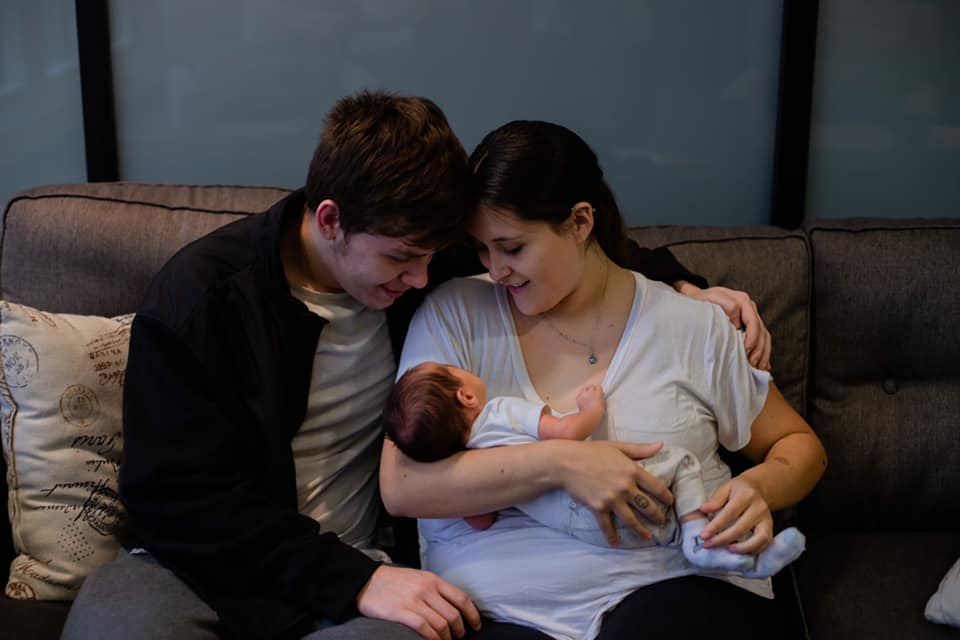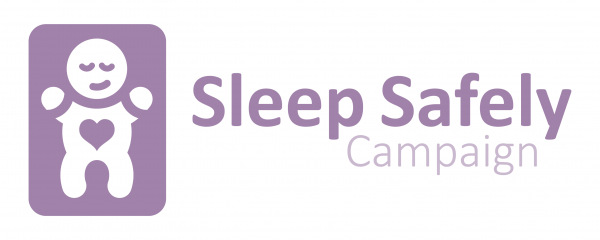Building a community wide effort to assure all babies have a safe place to sleep, combating SUIDs

By Angela Stanley
Indiana’s infant mortality rate has been under the microscope in recent years as parts of the state, like Allen County, continuously rank higher than the national average. Birth defects, prematurity and low birth weight, and maternal health are all leading causes of infant mortality, but one of the most difficult causes of death for parents and healthcare providers is when a seemingly healthy baby dies unexpectedly. According to the Centers for Disease Control and Prevention, “sudden unexpected infant death (SUID) is a term used to describe the sudden and unexpected death of a baby less than 1 year old in which the cause was not obvious before investigation.” Often these types of deaths happen because of unsafe sleep practices.
Sudden infant death syndrome (SIDS) accounts for the largest proportion of SUID for most racial and ethnic groups, “ranging from 39% of SUID among non-Hispanic Black infants to 44% of SUID among American Indian/Alaska Native infants and non-Hispanic White infants.” While infant mortality broadly is impacted by factors such as income, education, and other social determinants of health, a racial disparity exists for Black mothers and babies regardless of socioeconomic status. The infant mortality rate for Black babies is double the rate for White babies, and those rates do not improve for Black women with more education, higher incomes, or better housing conditions. This trend holds true for national SUID rates as Black and Indigenous infants are more than twice as likely to die than White and Asian babies.
Fortunately for Northeast Indiana, the state’s infant mortality rate has decreased over the last couple of years. Although the rates for Black and Hispanic babies remain higher than the national average, those numbers have also seen a decrease. Part of what’s helped lower the rate of infant death due to SIDS both locally and nationally has been the increased awareness around the importance of sleep safety. October is SIDS Awareness Month and Fort Wayne is ripe with resources and educational opportunities.
The St. Joseph Community Health Foundation has been instrumental in funding and supporting programming to improve the lives and health outcomes of parents and babies in Fort Wayne regardless of race, creed, sex, age, sexual orientation, status, or ability. As Fort Wayne OB-GYN and foundation board member Dr. Lora Overton states, “Ensuring the health and well-being of the marginalized and the most vulnerable in our society is imperative if we want to maintain the health and well-being of us all. This is in addition to the fact that it’s what Jesus would do.”
To that end, the foundation’s Prenatal and Infant Care Network (PIC) helps connect community members and organizations engaged in work on infant and prenatal health and coordinate resources. As part of that effort, PIC has partnered with additional organizations to launch a community-wide Sleep Safely Campaign aimed at making sure lower income families have a safe place to put their babies to sleep and educating them on how to safely put their babies to sleep. In the past 12 months, the foundation has also approved over $419,338 in funding to 11 local non-profits serving at-risk pregnant women. All of the grantees that offer educational programming prioritize safe sleep education for new parents and caregivers as a way to help prevent SUIDS.

Healthier Moms and Babies (HMB), a grantee of the foundation, is a perfect example. “Our families know and understand safe sleep. We talk about it at every visit,” says Paige Wilkins, the executive director of HMB. “Last year, 91% of our families were practicing safe sleep. We’ve only had one safe sleep death ever with HMB out of all the babies that have been born throughout our programming.” Part of the reason for their success is due to family education and being able to provide Pack ‘N Plays as safe sleep environments.
Babies are often cared for by different family members who sometimes have their own ideas about the best ways to administer that care. “A lot of women listen to their mom or their auntie when they are raising their baby and really take their advice,” says Wilkins, “so we do safe sleep as a family unit so that their mom can also see how the baby should sleep.”
The biggest help, though, has been the Pack ‘N Play because they are easy to move, easy to store, and give babies the safe sleep environment they need. “If somebody doesn’t have a crib,” says Wilkins, “probably the best thing you can do is get them a Pack ‘N Play.” HMB uses a 45-minute Cribs for Kids curriculum to administer their family education and provides every family with a Pack ‘N Play. “If grandma or someone else is going to be watching the baby, we’ll give them a Pack ‘N Play. If mom and dad aren’t together or if they’re living separately, we’ll do education with dad and get him a Pack ‘N Play as well.”
For Wilkins, it would be ideal to have a consistent curriculum that everyone in the community is using so that parents see and hear the same messages. In a perfect world, organizations like hers would be working with churches on the Southeast side to train and empower safe sleep ambassadors and have safe sleep classes specifically for caretakers to help educate new moms and each other. But for now, Wilkins is happy with the outcomes of her programming and the downward trend in the rates for SIDS. “Yes, we might still have some safe sleep deaths every year, but I can’t even imagine what that safe sleep death number would be if we didn’t have Pack ‘N Plays to give.”
Parkview Health is also invested in sleep safety through its Community Nursing Program managed by Carmen Moore. The nursing program’s approach to addressing infant mortality is threefold: safe sleep, breastfeeding, and tobacco cessation. Similar to HMB, the safe sleep program focuses on family training to make sure a consistent message is being sent to everyone caring for a baby. “Our safe sleep program provides moms and dads a safe place to sleep for their babies,” says Moore. “We provide a Pack ‘N Play, a sleep sack, and education to parents and grandparents that need it in our community.” While the safe sleep program is open to everyone, they especially try to work with agencies like HMB that serve diverse populations that are experiencing the highest rates of infant mortality.
As part of their three-pronged approach, breastfeeding support groups and lactation consultants are available to encourage moms to breastfeed their babies for at least their first year, as breastfeeding has been proven to decrease infant mortality. Finally, Parkview Health works with Tobacco Free Allen County to encourage mothers and family members not to smoke and provide monthly incentives of free diapers if families are proven to be tobacco free. Ultimately the goal is for women to be physically, emotionally, and mentally healthy even before they ever become pregnant.
The racial and ethnic disparities for moms and babies, however, is something that Moore always keeps in mind. Moore points to trust as being a factor in why Black mothers sometimes delay going to a doctor. Oftentimes Black mothers don’t feel heard or believed by doctors who don’t look like them. Research has shown that Black mothers and babies receive better care from Black physicians and hospitals that serve larger numbers of Black patients. “There’s all kinds of racism and implicit bias behind the scenes that needs to dealt with. We’re trying to get nurses and community health workers who look like the population they are serving to help build those relationships and close some of those gaps,” says Moore. A Parkview Health sponsored maternal mortality conference is also planned for May 2021 in order to have the conversation in Fort Wayne about why moms are dying after delivery and help healthcare providers be better informed.
In the end, Moore emphasizes that all of the organizations currently doing work on infant mortality and SIDS are doing the best they can with what’s currently available. “This is my passion. This is my ministry because I feel like I’m making an impact with everybody that I touch.”
